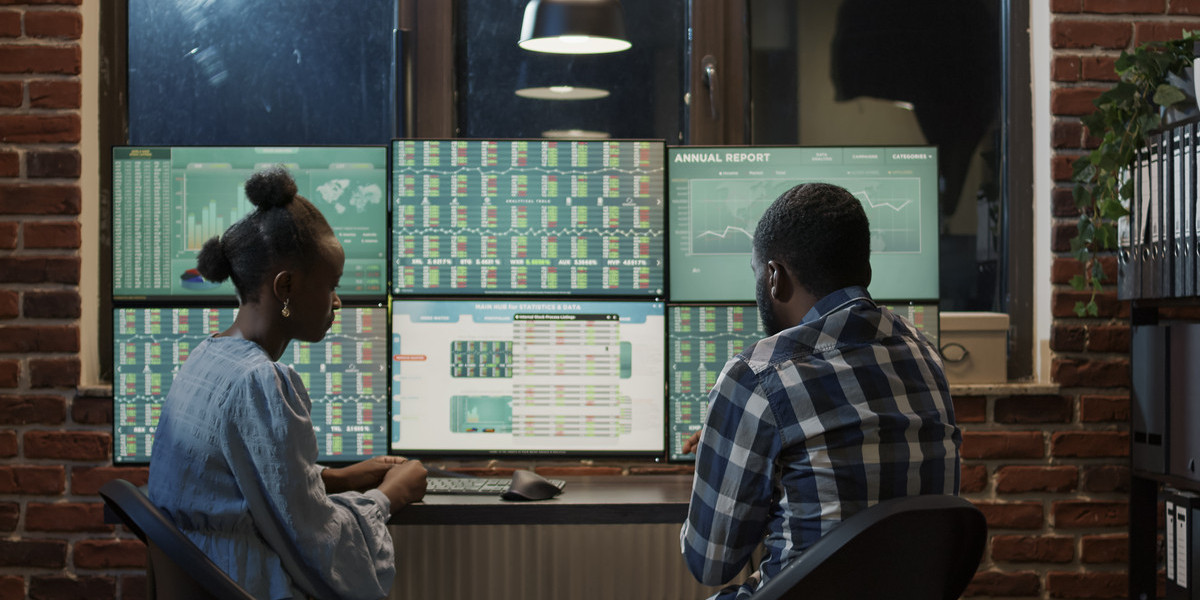
It's been another 'Manic Monday' for savers and investors.

Having awakened at the start of recently to the game-changing news that an unknown Chinese start-up had actually established a cheap synthetic intelligence (AI) chatbot, they discovered over the weekend that Donald Trump actually was going to carry out his risk of introducing a full-blown trade war.

The US President's decision to slap a 25 per cent tariff on items imported from Canada and Mexico, wiki.insidertoday.org and a ten percent tax on deliveries from China, sent stock markets into another tailspin, just as they were recovering from last week's thrashing.
But whereas that sell-off was mainly confined to AI and other technology stocks, historydb.date this time the effects of a potentially lengthy trade war could be a lot more harmful and prevalent, and possibly plunge the global economy - consisting of the UK - into a depression.
And the decision to delay the tariffs on Mexico for one month used only partial respite on worldwide markets.
So how should British financiers play this highly unstable and unpredictable scenario? What are the sectors and possessions to prevent, and who or garagesale.es what might become winners?
In its most basic type, a tariff is a tax enforced by one country on products imported from another.
Crucially, the task is not paid by the foreign business exporting however by the receiving organization, which pays the levy to its federal government, providing it with helpful tax earnings.
President Donald Trump speaking to reporters in Washington today after Air Force One touched down at Joint Base Andrews
These could be worth as much as $250billion a year, or 0.8 per cent of US GDP, according to experts at Capital Economics.
Canada, Mexico and China together represent $1.3 trillion - or 42 per cent - of the $3.1 trillion of items imported into the US in 2023.
Most financial experts hate tariffs, mainly since they trigger inflation when business pass on their increased import costs to customers, sending out prices higher.
But Mr Trump enjoys them - he has explained tariff as 'the most stunning word in the dictionary'.
In his current election campaign, Mr Trump made clear of his plan to impose import taxes on neighbouring nations unless they suppressed the unlawful flow of drugs and migrants into the US.
Next in Mr Trump's sights is the European Union, where he's said tariffs will 'certainly take place' - and perhaps the UK.
The US President says Britain is 'way out of line' but a deal 'can be worked out'.
Nobody must be amazed the US President has chosen to shoot very first and ask questions later on.
Trade sensitive companies in Europe were also hit by Mr Trump's tariffs, consisting of German carmakers Volkswagen and BMW
Shares in European customer items business such as beverages giant Diageo, that makes Guinness, fell sharply amid fears of higher expenses for their products
What matters now is how other nations react.
Canada, Mexico and China have actually currently retaliated in kind, prompting fears of a tit-for-tat escalation that could engulf the entire international economy if others follow suit.
Mr Trump yields that Americans will bear some 'short-term' pain from his sweeping tariffs. 'But long term the United States has been swindled by essentially every country worldwide,' he included.
Mr Trump states the tariffs enforced by former US President William McKinley in 1890 made America thriving, ushering in a 'golden age' when the US overtook Britain as the world's biggest economy. He wishes to duplicate that formula to 'make America great again'.
But specialists say he runs the risk of a re-run of the Smoot-Hawley Tariff Act of 1930 - a disastrous measure introduced just after the Wall Street stock market crash. It raised tariffs on a broad swathe of goods imported into the US, resulting in a collapse in international trade and intensifying the impacts of the Great Depression.
'The lessons from history are clear: protectionist policies hardly ever deliver the desired benefits,' says Nigel Green, chief executive of wealth supervisor deVere Group.
Rising expenses, inflationary pressures and interrupted global supply chains - which are much more inter-connected today than they were a century ago - will impact services and customers alike, trademarketclassifieds.com he included.
'The Smoot-Hawley tariffs got worse the Great Depression by stifling international trade, and today's tariffs run the risk of triggering the very same damaging cycle,' Mr Green adds.
How Trump's individual crypto raises worries of 'hazardous' corruption in White House
Perhaps the very best historic guide to how Mr Trump's trade policy will affect financiers is from his first term in the White House.
'Trump's launch of tariffs in 2018 did raise profits for America, but US business earnings took a hit that year and the S&P 500 index fell by a fifth, so markets have not surprisingly taken scare this time around,' states Russ Mould, director at investment platform AJ Bell.
The bright side is that inflation didn't surge in the consequences, which might 'relieve existing financial market fears that higher tariffs will indicate higher costs and higher rates will indicate higher interest rates,' Mr Mould adds.
The factor costs didn't jump was 'because customers and business refused to pay them and sought out cheaper choices - which is specifically the Trump strategy this time around', Mr Mould explains. 'American importers and foreign sellers into the US chosen to take the hit on margin and did not pass on the cost impact of the tariffs.'
In other words, business took in the greater costs from tariffs at the expense of their revenues and sparing customers rate rises.
So will it be different this time round?
'It is hard to see how an escalation of trade stress can do any excellent, to anybody, at least over the longer run,' states Inga Fechner, senior financial expert at financial investment bank ING. 'Economically speaking, escalating trade tensions are a lose-lose circumstance for all countries involved.'
The impact of a global trade war might be ravaging if targeted economies retaliate, prices increase, trade fades and growth stalls or falls. In such a circumstance, rate of interest might either rise, to curb higher inflation, galgbtqhistoryproject.org or fall, to improve drooping development.
The agreement amongst experts is that tariffs will suggest the cost of obtaining stays higher for securityholes.science longer to tame resurgent inflation, but the fact is nobody actually understands.
Tariffs might also result in a falling oil cost - as need from market and customers for dearer products droops - though a barrel of crude was trading higher on Monday in the middle of worries that North American products might be interfered with, leading to scarcities.
Either method a significant drop in the oil cost may not suffice to conserve the day.
'Unless oil rates stop by 80 percent to $15 a barrel it is not likely lower energy costs will offset the effects of tariffs and existing inflation,' states Adam Kobeissi, founder of a prominent investor newsletter.
Investors are playing the 'Trump tariff trade' by switching out of risky properties and into standard safe havens - a trend professionals say is likely to continue while uncertainty persists.
Among the hardest struck are microchip and technology stocks such as Nvidia, which fell 7 per cent, and UK-based Arm, which is off 6 percent, as monetary markets brace for retaliation from China and curbs on semiconductor sales.
Other trade-sensitive business were likewise struck. Shares in German carmakers Volkswagen and BMW and consumer products business such as beverages huge Diageo fell greatly amid worries of higher expenses for their items.
But the most significant losers have been cryptocurrencies, which soared when Mr Trump won the US election however are now falling back to earth.
At $94,000, Bitcoin is down 15 percent from its recent all-time high, while Ethereum - another significant cryptocurrency - fell by more than a third in the 60 hours considering that news of the Trump trade wars hit the headlines.
Crypto has actually taken a hit since financiers think Mr Trump's tariffs will sustain inflation, which in turn may cause the US main bank, the Federal Reserve, to keep interest rates at their present levels or even increase them. The effect tariffs might have on the path of interest rates is uncertain. However, greater rates of interest make crypto, which does not produce an income, less attractive to financiers than when rates are low.
As investors leave these extremely unpredictable assets they have actually stacked into traditionally safer bets such as gold, which is trading at a record high of $2,800 an ounce, and the dollar, which rose against significant currencies the other day.
Experts state the dollar's strength is really a boon for the FTSE 100 since a number of the British business in the index make a great deal of their money in the US currency, suggesting they benefit when revenues are equated into sterling.
The FTSE 100 fell yesterday however by less than a lot of the significant indices.
It is not all doom and gloom.

'One big hope is that the tariffs do not last, while another is that the US Federal Reserve assists with some rate of interest cuts, something for which Trump is currently calling,' says AJ Bell's Mr Mould.
Traders expect the Bank of England to cut rates this week by a quarter of a percentage indicate 4.5 per cent, while the chance of 3 or more rate cuts later this year have actually increased in the wake of the trade war shock.
Whenever stock exchange wobble it is tempting to stress and sell, however holding your nerve generally pays dividends, specialists state.
'History also reveals that volatility breeds opportunity,' says deVere's Mr Green.
'Those who are reluctant danger being caught on the wrong side of market movements. But for those who gain from previous disturbances and take decisive action, this period of volatility might provide a few of the very best opportunities in years.'

Among the sectors Mr Green likes are European banks, due to the fact that their shares are trading at fairly low rates and akropolistravel.com interest rates in the eurozone are lower than elsewhere. 'Defence stocks, such as BAE Systems, are likewise appealing since they will provide a stable return,' he adds.
Investors should not hurry to offer while the image is cloudy and can watch out for possible bargains. One method is to invest routine month-to-month amounts into shares or funds rather than big lump sums. That method you lower the danger of bad timing and, when markets fall, you can purchase more shares for your money so, as and when rates increase again, you benefit.








